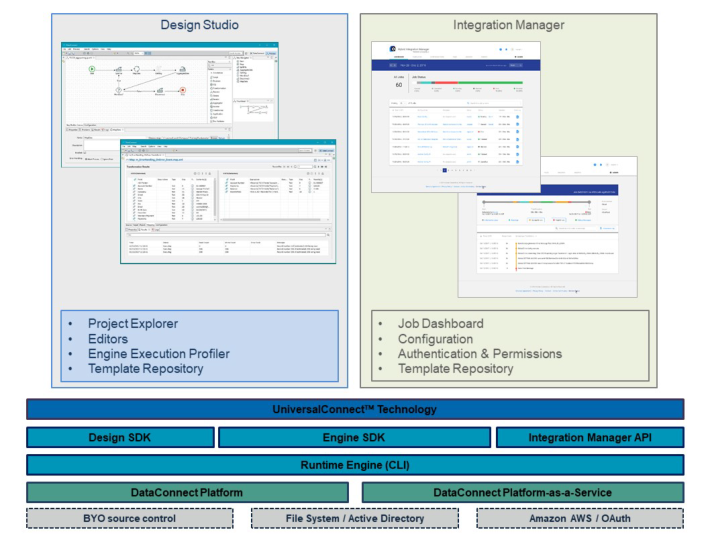Actian DataConnect Architecture
Actian DataConnect is a data integration platform built on a common architecture that enables Extract, Transform, and Load (ETL), Enterprise Information Integration (EII), Enterprise Application Integration (EAI) and Service Oriented Architecture (SOA) deployment models at enterprise-scale. This common architecture provides the best in productivity tools for maximizing developer efficiency as the scope of project expands, and eases project management with open repositories to house large-scale, integration designs. Powerful, low-TCO Actian integration engines also enable wide-scale corporate deployments.
The following image shows the Actian DataConnect architecture.

The following table provides information about the components in the architecture.
Component | Description |
|---|---|
Design Studio IDE (Actian DataConnect User Interface) | Built on the Eclipse framework, the IDE is delivered as a standalone Rich Client Platform (RCP) desktop application and as Eclipse plug-ins that can be imported into existing Eclipse development installations. The UI provides a set of editors to design and modify integration artifacts that are stored as machine and human readable metadata (that is, JSON and/or XML). The editors allow developers and business users to design integrations with drag-and-drop interactions and provide multiple ways to document the integration as it is created. • Project Explorer: Provides a hierarchical view of the contents in the current workspace. It displays the projects that contain various artifacts created within Actian DataConnect (maps, processes, schema, package inventories, EZscript files, and so on) and other files such as .txt. • Editors: Enables rapid development of process workflows, transformation maps, schema, and scripts that are reusable component pieces of an integration pipeline. Maps use an event-condition-action paradigm to build rules with little to no code. Process workflows provide end-to-end data processing pipelines that are comprised of map steps and myriad other capabilities delivered by Message Component plug-ins. • Engine Execution Profiler: A visual aid to identify opportunities to improve performance. Time and Iteration histogram views quickly provide information about the actions that are time consuming and are called most frequently. A grid view of the entire integration is also available and provides execution statistics at all levels including individual lines of script. • Template Repository: Design metadata repository is an accessible, file-system based mechanism that provides simple and flexible versioning yet leaves flexibility so that organizations can leverage their own existing source control applications. It is inherently secure, that is, it uses the same network authentication and file sharing practices that you already have. |
Integration Manager | A Web application management interface that users can use to deploy, configure, and monitor integrations in the production and run-time environments. With intuitive interactions and views, it allows you to manage all aspects of the integration deployment such as: • Dashboard: View job history and retrieve log files for further analysis or sharing. • Configuration: Define input parameters (macros), schedules, integration packages and other ancillary files, and run location for cloud or on-premise. Templates are special configurations used for bulk updates to propagate change to any configuration based on them. • Permissions: Administrators can control user access to integrations and configurations by assigning read, write, and execute privileges to individuals or groups. • Files: Integration packages that are ready for deployment are stored in this repository so that users can share them with other users according to governance policies. Integration Manager is available as an on-premise deployment option that can be installed entirely within your firewall or as an Actian DataCloud fully hosted “platform-as-a-service” for your convenience. For detailed information about Integration Manager, see the Integration Manager documentation available at docs.actian.com. When Actian hosts Integration Manager, Hybrid Integration Agents are used to securely connect to local data end-points. Additionally, the Agents communicate job configuration and history metadata to/from Actian DataCloud through secure HTTPS. Note: Actian DataCloud is SSAE-16 SOC1 Type 2 compliant and currently undergoing audit for SOC2. Integration Manager provides an easily consumable RESTful API for complete automation of deployment, configuration, and execution of the integrations. For more details, see the following link: http://actian-im-api-docs-us-east-1.s3-website-us-east-1.amazonaws.com/#/ |
UniversalConnect™ Technology | This is the underlying connectivity infrastructure within Actian DataConnect. It provides the ability to connect to virtually any source of data in the world and is represented as an extensive library of native connectors and components along with a catalog of connectors and components developed using the Data Mediation Service (DMS) and Message Component Framework (MCF) extensibility frameworks. |
Studio SDK | An SDK that enables a developer to create custom, purpose-specific design interfaces that generate integration artifacts for execution by the Actian DataConnect Runtime Engine. It simplifies the ability to dynamically generate integrations for embedding scenarios. |
Runtime Client SDK | The engine has a command line interface that is used to manage integrations through user-defined scripts. It also has a Java SDK for more seamless embedding scenarios and provides the run-time module in the execution service at the center of the Integration Manager server stack. You can download the client SDK samples and the Readme file (provides information about the client SDK) from the following location: https://github.com/ActianCorp/dc.clientsdk_samples |
Integration Manager API | Each integration deployed and configured using Integration Manager is automatically assigned an HTTP listener endpoint that can be executed remotely with a simple POST command. A message can be sent with the command that can be used as data and run-time parameters when the job is executed. Further, a RESTful API provides the ability to fully embed and dynamically manage the deployment, configuration, and monitoring of your integrations. |
Runtime Engine (CLI) | The Runtime Engine is a high-performance, C++ cross platform portable engine that interprets the integration artifacts and executes them on Windows or Linux servers. A single portable integration package (*.djar) can be executed on any of these platforms with no code changes. |
Last modified date: 01/08/2026